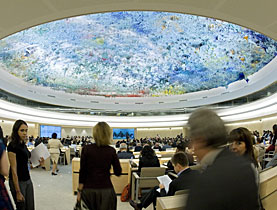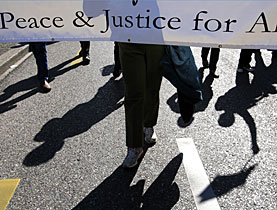Racial discrimination invades all areas of life

Being a Swiss national or permanent resident is no protection against racial discrimination and intolerance, a Federal Anti-Racism Commission report has found.
People assumed to be from the Balkan region and non-whites are most at risk of being treated differently in virtually all areas of life, even if they are Swiss citizens.
According to data compiled by counsellors at discrimination information centres in 2008, Swiss residents sought advice on everything from rejection of naturalisation applications to physical violence on the street.
Complainants also reported unequal treatment, bullying at work, refusal of access to public services, damage to property, threats, verbal abuse and propaganda.
Roughly half of the cases of alleged discrimination, xenophobia and intolerance dealt with by the five organisations participating in the survey were substantiated by their staff. The remainder were deemed to be problems unrelated to race or ethnic origin.
One commune rejected in writing a naturalisation application on the grounds that the man in question was actively involved in an association advocating an Islamic centre, which showed that he was strongly tied to the culture of his country of origin and “could not be expected to adapt to Swiss values”.
Tip of the iceberg
Doris Angst of the Federal Anti-Racism Commission told swissinfo.ch that the cases featured in the report represented only the tip of the iceberg.
“People are more aware of the discrimination that takes place in public but there is so much that is unseen, in all sorts of areas, such as the health system, the police and recruitment,” she said.
More than a quarter of those reporting racial discrimination were from sub-Saharan Africa. But immigrants from neighbouring countries also made their way to anti-racism or intercultural advice centres.
One blatant example of discrimination based on nationality took place in a classroom. When a German child was unable to respond to a question about a Swiss custom, a Turkish classmate provided the answer. This prompted the teacher to say to the German girl that if even a little Turk knew this custom and she didn’t, she ought to return to Germany.
This case was unusual in that it involved a teacher directly targeting pupils. Most cases of racist incidents in school recorded by the report were between pupils.
Young men of Balkan origin were most likely to suffer unfair treatment in their leisure activities, such as trying to gain entry into bars or clubs.
Isolated
According to the authors, victims whose experiences are detailed in the report were often isolated by what happened and many did not want any further action to be taken after registering their complaint.
The non-governmental organisation Humanrights.ch coordinated the research project. Its president, Michael Marugg, told swissinfo.ch that the report would shed some light on an issue that is difficult to quantify.
“It’s a significant hidden problem and only becomes public in isolated and important cases,” he said.
Marugg pointed to the lack of anti-discrimination legislation as a weakness in Switzerland. “We don’t have a general anti-discrimination law, we have a penal code but only very strong and very isolated cases can be dealt with by that; what we need is a more general anti discrimination law that can also be the basis for prevention.”
There is significant regional variation in the level of support available for people affected by discrimination across Switzerland, the authors of the report noted.
Organisations in French-speaking Switzerland did not participate in the 2008 survey for financial and organisational reasons but are due to take part next year.
Around a fifth of Switzerland’s 7.7 million inhabitants are foreigners, with an estimated 500,000 of them being second or third generation.
The project was a joint venture between the non-governmental organisation Humanrights.ch and the Federal Anti-Racism Commission.
The participating advice centres were based in the German-speaking part of Switzerland:
TiKK – the Competence Centre for Intercultural Conflict.
SOS Rassismus
STOPP Rassismus – Northwestern Switzerland advice organisation against discrimination and racism.
Gggfon.ch – Together against violence and racism. (Bern region)
The Federal Anti-Racism Commission also supplied data from the inquiries it deals with.
The government has been considering plans to outlaw the public use of racist symbols, including flags and salutes.
Offenders would face a fine, according to a proposal published by the justice ministry on Wednesday.
Political parties, the cantons, as well as organisations have three months to give their opinions on the plan.
The cabinet will then send a bill to parliament for discussion.

In compliance with the JTI standards
More: SWI swissinfo.ch certified by the Journalism Trust Initiative













You can find an overview of ongoing debates with our journalists here . Please join us!
If you want to start a conversation about a topic raised in this article or want to report factual errors, email us at english@swissinfo.ch.